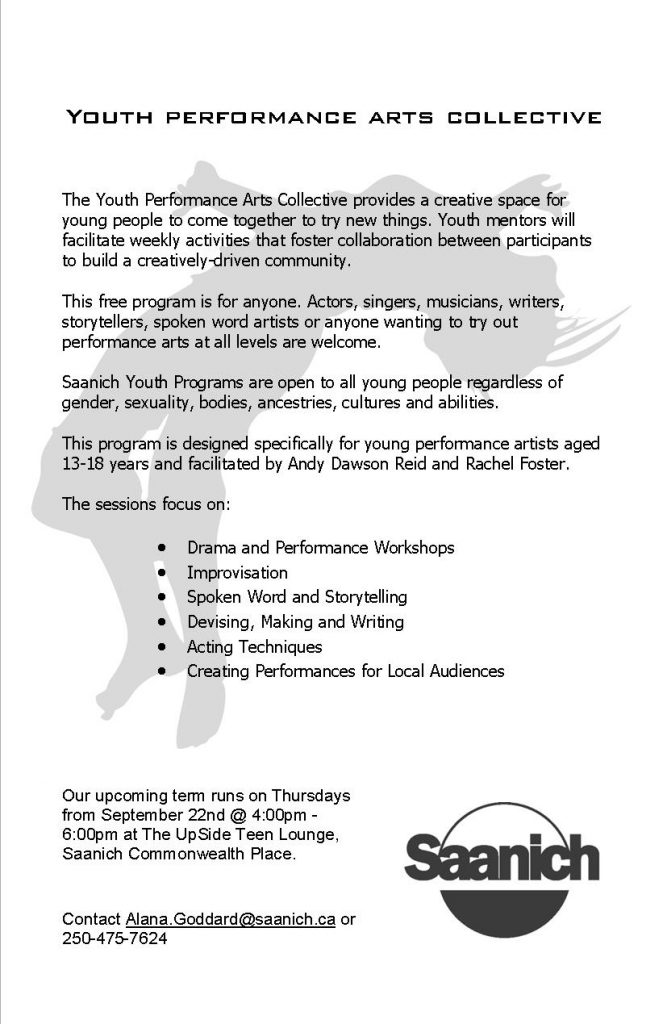You are currently browsing articles tagged Drama.
Tags: Drama, Victoria, Youth Theatre
 “More on that anon” – was the promise made at the end of my last post concerning our attempts to set up a new form of youth theatre in Victoria. That item was posted on June 1st and it is now September 9th. “Just what the heck is happening?” – I hear you cry! “How long is anon anyway?“.
“More on that anon” – was the promise made at the end of my last post concerning our attempts to set up a new form of youth theatre in Victoria. That item was posted on June 1st and it is now September 9th. “Just what the heck is happening?” – I hear you cry! “How long is anon anyway?“.
OK – here is the lowdown…
As was detailed in the aforementioned post the UK has long benefited from a thriving youth theatre community, much of it supported by local authorities. The municipalities in BC (the equivalent of the UK’s LAs) tend – where they have a theatrical offering for young people at all – to buy in courses from the local commercial organisations.
I discovered late last year, however, in the course of my researches that the District of Saanich had just recently adopted a new Youth Development Strategy. This estimable document was couched in familiar language – its principles very much in accord with those that I myself espouse. My subsequent approach to them – after the usual period in which nothing at all appeared to be happening – led to a meeting with a particularly dynamic Youth Programmer who set up a gathering of like-minded people which included a young lady who was subsequently to become the other half of our team. The meeting also led to our contacts with the University of Victoria, Claremont Secondary School, the Belfry 101 program and the Kate Rubin Studio.
By early summer our fact finding mission into Victoria’s youth drama provision was complete and it had been decided that we would set up an after-school group at the Teen Lounge in the Saanich Commonwealth Centre. As Parks and Recreation (the department responsible for the municipality’s leisure centres) programs run in parallel with school terms our new venture would not start until September – which suited us well as it would give ample to time to develop the initial curriculum…
…which is exactly what we have been doing over the past months. We are at the time of writing less than two weeks from the date of our inaugural session and – in curricular terms – the structures are all in place. We will, naturally, be adding and developing the detail as we go along.
All efforts now switch to publicity, in an attempt to ensure that we do not find ourselves standing alone in an empty space – devoid of eager young creatives – with our session notes dangling impotently from our hands… wondering what to do with ourselves.
Our concern bears the title – ‘Youth Performance Arts Collective’, which will be at once be abbreviated to ‘Y PAC’. This soubriquet may strike the gentle reader as being a little pompous – and that reader might have a point. The guardians of the public services in BC take their responsibilities seriously and are impressively earnest about what they do. I can live with that!
Any introduction of notes of irony can wait…
Tags: Drama, Victoria, Youth Theatre
 About a month ago I posted to this journal two missives – to be found here and here – in which I summarised the results of our researches into the opportunities for drama and theatre study and practice for young people in and around the Greater Victoria area. In the second such I promised that I would comment further as to what I perceived to be the gaps in that offering and had I not – as is ever the way – been overtaken by events (‘dear boy!’) I would already have fulfilled that pledge.
About a month ago I posted to this journal two missives – to be found here and here – in which I summarised the results of our researches into the opportunities for drama and theatre study and practice for young people in and around the Greater Victoria area. In the second such I promised that I would comment further as to what I perceived to be the gaps in that offering and had I not – as is ever the way – been overtaken by events (‘dear boy!’) I would already have fulfilled that pledge.
As was explained in the first of those posts, the provision throughout the secondary schools of Victoria and the Saanich peninsula would appear to be uneven. It is fair to say that private schools probably do rather better than do public (in the Canadian sense) schools – as is the case in the UK – and though there are definitely some institutions which are exceptional in dramatic terms, for others it is very much more of a lottery.
Outwith the school sector itself there are a number of professional organisations offering acting and stagecraft classes and other theatrical activities. These are – however – almost without exception commercial enterprises that charge termly or annual fees. These costs can quickly add up to a significant amount and, whereas for younger children such are normally borne by parents, when it comes to teenagers they may well be expected to make a contribution themselves.
It must be clear from the above that a significant proportion of the teenage population of Greater Victoria might well find themselves disenfranchised from such a valuable resource – either through not attending the right school or by not being able to afford these extra-curricula classes.
As far as I can determine there was no real echo in Canada of the Youth Theatre movement that spread rapidly across the United Kingdom (and some other parts of the world) during the 1960s and 1970s. There are, naturally, blazing exceptions, but by their very presence they merely illuminate the lack elsewhere.
Though the movement in Britain comprised groups established under a plethora of different contexts – some appended to mainstream theatres – some commercially run – some funded by the local authorities (municipalities) and so forth – it very rapidly became clear that these energetic bodies – often run by enthusiastic volunteers – offered so many benefits to young people in terms of personal growth, social development and the promotion of creativity that support for them quickly became widespread. Every self-respecting district, county and metropolis offered some sort of financial support to one or more of these groups – if only by making available some empty space in which their arts could be practiced.
That I am an enthusiast for the work done by these splendid bodies need hardly be mentioned. I spent upward of two decades as a facilitator at one such, wearing such a wide range of hats that I might have attempted the establishment of a millinery! As is so often the case with such voluntary work I am very sure that I got as much – if not more – from the whole adventure as did the cavalcade of youth that passed through our doors.
Which might – of course – go a long way to explaining why I am now trying to start something similar here in Victoria.
More on that anon…
Tags: Drama, Victoria, Youth Theatre
 In the first part of this post (which like so many such started out as a single succinct study until the habitual ramblings of my so-called style brought me to the realisation that I had probably already outstayed my welcome… (See what I mean?)) I painted a brief sketch of the provision within Victoria’s secondary schools for those youngsters who wished to study drama or to practice theatre.
In the first part of this post (which like so many such started out as a single succinct study until the habitual ramblings of my so-called style brought me to the realisation that I had probably already outstayed my welcome… (See what I mean?)) I painted a brief sketch of the provision within Victoria’s secondary schools for those youngsters who wished to study drama or to practice theatre.
Outside the school system – for those whose schools do not make adequate provision or for others who wish to take things further – there are a number of options. A variety of organisations offer a range of drama, acting and performance classes, some of them so doing through a range of outlets such as leisure or recreation centres as well as from their own premises.
The best known and regarded of these are probably Kaleidoscope Theatre and the Kate Rubin Studio. Though each has its own particular USP they aim broadly at the same constituency, offering theatrical activities across a wide range of age groups but also focusing on those with ambitions to take up one the thespian professions. Both are themselves professional operations and are well resourced.
Kate Rubin herself was – for a considerable time – also involved with another admirable offering for the young of Greater Victoria… the Belfry 101 programme. I have waxed lyrical about the Belfry Theatre on more than one occasion. Apart from providing the best theatre-going experience in Victoria the Belfry also hosts this imaginative program for school-aged youngsters on an annual basis. This is based around the Belfry’s main house programme, and gives the young members access to the casts and creatives involved in each show, in addition to offering them the opportunity to create their own showcase work at the end of the season.
The Belfry 101 programme was created in the late 1990s by University of Victoria Associate Professor Monica Prendergast, and has operated to great acclaim ever since. Both Monica Prendergast and Kate Rubin were kind enough to agree to meet us so that we could pick their respective brains concerning youth drama provision in Victoria. We are most grateful both to them and to Colin Plant, who heads the Fine Arts programme at Claremont Secondary School.
Now that I have provided the broadest of sketches of the youth drama provision at this end of Vancouver Island and in the process, hopefully, given the gentle reader an idea as to what is available – it is now time to offer an opinion as to what is not…!
And, yes! – that means another post…
Tags: Drama, Victoria, Youth Theatre
 “But a city is more than a place in space, it is a drama in time.”
“But a city is more than a place in space, it is a drama in time.”
Patrick Geddes
It was some time ago now – back in February in fact – that I posted a missive to this journal entitled Youth Theatre Dreaming in which I declared my intention of starting something along the lines of a youth theatre here in Victoria. You may have been wondering what has become of that purpose, particularly given that I wrote at the time that “things have been set in motion”.
Though I feel it probable that the gentle reader has grown somewhat weary over the years of being informed just how long it takes for this, that and the other to come to pass in our lives (which dilatory state of affairs seems to have been our lot for some considerable time now) in this case things actually have been happening… albeit – slowly!
In keeping with the ponderous nature of the progress this will not be the post that gives you all the details of the project. That will be the next one (or maybe the one after that!). This one will give some essential background and reflects the fact that one of the things that we were briefed to do by those with whom we intend to work was to carry out some research into the current dramatic provision for young people in and around Greater Victoria.
This is what we found.
Across the high schools of Greater Victoria the provision of drama teaching is – to put it mildly – mixed! Some schools have extensive offerings – such as the excellent Claremont Secondary in Cordova Bay which has a fully fledged Fine Arts programme running across the whole school. In other secondary schools drama is taught by whoever can be prevailed upon to pick it up – often someone from the English department. The content is then based upon whatever knowledge happens to be available. There is no common curriculum and drama would seem to be one of those subjects the timetabling of which has, of late, been squeezed.
One thing is, however, common to practically all schools – music theatre! I have never encountered such a plethora of music theatre courses and musical shows. It would seem that, even if no other offering for drama study is available, there is always the music theatre option.
Now – having written a number of musicals myself back in my youth theatre days I am not opposed to the form per se, but I was startled to discover that these shows are a very different proposition. These are based on hit shows from Broadway and the like, but stripped down for school use and with the entire production offered as a package – pre-recorded music, choreography, costume and set design and so forth.
Hmmm!
Outside school there are – as one would expect – other possibilities. Full details on these must, however, needs wait for the second part of this missive.
Tags: Drama, Victoria, Youth Theatre
 Last week the Kickass Canada Girl and I attended the Royal Theatre in Victoria for one of two performances by the Royal Winnipeg Ballet of a new piece – ‘Going home Star – Truth and Reconciliation‘ – which was commissioned for the Ballet by Artistic Director André Lewis and presented with the support of the Truth and Reconciliation Commission of Canada.
Last week the Kickass Canada Girl and I attended the Royal Theatre in Victoria for one of two performances by the Royal Winnipeg Ballet of a new piece – ‘Going home Star – Truth and Reconciliation‘ – which was commissioned for the Ballet by Artistic Director André Lewis and presented with the support of the Truth and Reconciliation Commission of Canada.
The subject matter of this ambitious work – concerning the residential schools programme controversy and its effect on those of First Nations’ descent – attracted a heavyweight artistic team. Joseph Boyden – award winning Canadian author of ‘Three Day Road‘ and ‘Through Black Spruce‘ – provided the story. Mark Godden – whose list of credits and awards throughout North America is too impressively extensive to list here – choreographed. The excellent music was by Christos Hatzis – two time Juno award winner.
Those without Canada may not be familiar with the background of the residential schools programme. Herewith for your benefit (should you be at all interested) is a brief history lesson.
An amendment to the Indian Act of 1876 – intended to remove First Nations’ children from the influence of their families and culture to assimilate them into the dominant ‘Canadian’ culture – made attendance compulsory at day, industrial or residential schools. By 1931 there were 80 of these residential schools across Canada. The numbers declined thereafter, with the last federally operated school closing in 1996, but by then some 150,000 (around 30%) First Nations children had passed through the system. More than 6,000 did not survive the experience, dying whilst yet in attendance.
A new consensus emerged in the early 21st century that these residential schools had done significant harm to the Aboriginal children who attended them by removing them from their families, depriving them of their ancestral languages, through sterilization, and by exposing many of them to sexual abuse by staff members and other students. In June 2008 a public apology was offered by the then Prime Minister, Stephen Harper, on behalf of the Government of Canada. At around the same time the Indian Residential Schools Truth and Reconciliation Commission was established to uncover the truth about the schools.
As might be gathered from the weighty subject matter, experiencing a work of conscience and of art such as this was no walk in the park. Though the music set the tone masterfully – being a highly intelligent blend of European classical, contemporary stylings, Inuit throat singing and traditional drumming – and the movement was both highly imaginative and at times exquisitely beautiful, the work was also inevitably harrowing at times. The Girl – whose grandmother and two of whose aunts were survivors of the residential schools – not surprisingly found it particularly difficult.
I think that it is fair to say that not everything came off – and the fact that the Royal Winnipeg Ballet includes not one dancer of Aboriginal origin left this attendee at least feeling distinctly ambivalent – but in general the avoidance of the obvious pitfalls and the bravery of the conception and the execution should be – and was – applauded unreservedly.
It is right that art should be able take such risks and sometime to make us feel less than comfortable by so doing. Long may it continue to do so.
Kudos to all concerned.
 Those familiar with my oeuvre may perhaps be accustomed to my occasion panegyrics in praise of one or other of the BBC’s splendid drama productions – ‘Parade’s End‘ back in 2012 for example – or the more recent ‘River‘ of last year. Should you be one such you may be wondering (if you have nothing considerably better to do with your time) why I have not likewise registered my approval of the wondrous adaptation of John Le Carré’s ‘The Night Manager‘ which approaches its culmination this Easter weekend on BBC1.
Those familiar with my oeuvre may perhaps be accustomed to my occasion panegyrics in praise of one or other of the BBC’s splendid drama productions – ‘Parade’s End‘ back in 2012 for example – or the more recent ‘River‘ of last year. Should you be one such you may be wondering (if you have nothing considerably better to do with your time) why I have not likewise registered my approval of the wondrous adaptation of John Le Carré’s ‘The Night Manager‘ which approaches its culmination this Easter weekend on BBC1.
I has indeed been remiss of me not so to do.
It would be fair to say that the show is in need of no such puffery from me or – apparently – from anyone else. Viewing figures started high and went up from there. This is one of those occasions on which both the BBC and the viewing public get it splendidly right. This is one classy production – based on a typically strong Le Carré novel but given an update and polish that not only takes nothing away (something of a rarity in itself) but in fact adds quite considerably.
Money has clearly been spent on this Anglo/American co-production – and spent in a way that makes this viewer at any rate purr with pleasure. The writing is precise and spare, the direction and camerawork would not be out of place on the big screen and the acting is sublime.
There is no getting away from the fact that the English public school thespist ‘mafia’ – out here yet again in force in the shape of not one but two Old Etonians – currently appears to pretty much have the monopoly on the cream of the TV and film roles going. Many commentators see Tom Hiddleston’s expertly judged performance as the brooding hero Jonathan Pine as nothing less than a Bond audition. He is – however – given a serious run for his money by Hugh Laurie’s ‘worst man in the world’ – Richard Onslow Roper – from whom it is difficult to drag one’s gaze. Add the wonderful Tom Hollander and Olivia Coleman to the mix and one is blessed with a heady brew of a cast.
It can only be a sad indictment of the failure to invest adequately in the state secondary education sector in the UK – not to mention the ideological interference in the running thereof – that so many of the new breed of actors have as their backgrounds the rarefied atmosphere of the public (UK sense here) schools. Eddie Redmayne, Tom Hiddleston, Harry Lloyd, Rory Kinnear, Henry Lloyd-Hughes, Benedict Cumberbatch, Damian Lewis, Dominic West, Chiwetel Ejiofor, Rosamund Pike, Rebecca Hall, Emily Blunt… the list goes on. Of course these schools have wonderful facilities and can recruit teaching staff from the top drawer, but there is more to it than that. Whatever the reason, the top independent schools in the UK (as most likely in Canada and elsewhere also) ascribe an importance to the arts that is no longer the case in other parts of the ‘system’.
Flame off!
Anyway – though it may seem a little late to be recommending ‘The Night Manager‘ at this juncture do remember that it is an Anglo/American production that has to date been only seen in the UK. It will doubtless be appearing on a streaming service near you ere long.
Don’t miss it!
 Those gentle readers who have become accustomed to my – er – ‘style’ will doubtless already have gathered that the recent ‘nostalgic’ post concerning my youth theatre past was an essential part of the extended meditation on the subjects of home-sickness and significance with which I have of late been grappling. Big topics both!
Those gentle readers who have become accustomed to my – er – ‘style’ will doubtless already have gathered that the recent ‘nostalgic’ post concerning my youth theatre past was an essential part of the extended meditation on the subjects of home-sickness and significance with which I have of late been grappling. Big topics both!
You will probably also have figured – had you been of a mind to plough through those tracts – that the object of my cogitation whilst beset by that malaise in the run up to Christmas was indeed that very period in my life. For reasons that I could not immediately determine I found myself exhaustively replaying memories of the several decades and more from the early 70s to the mid 90s during which I helped to run a local authority youth theatre in the south east of England.
When I was but a young man I desperately wished to become a professional musician. Others with whom I played did achieve this – some to great success – but it became clear pretty early on that I was not sufficiently gifted to belong amongst their number. When I got involved with the youth theatre and began to write musicals for them I took that very seriously as well, hoping – with my co-writers – that we might at some point merit a professional performance of one of these works. That didn’t happen either. Now that I write plays – having run out of partners with whom to write musicals – I still harbour hopes that I might eventually get one published. The odds are long, I know – but this is a dream that I still cherish.
Through my great fortune in having being given the chance to work with the drama departments of two of the UK’s greatest schools – each of which has more than played its part in the generation of the new wave of brilliantly talented young thespists – I have slowly come to the realisation that my true role lies in the encouragement and promotion of a passion for creativity in young people.
I am not qualified to teach in BC and I would not in any case wish to go back to work in education. It became very clear to me during my pre-Christmas funk, however, that my true role is in doing almost exactly that which I was doing more than two decades previously. I should be involved in youth theatre. I determined there and then that, should I not be able to find a suitable venture with which to become involved, I would just have to start something myself.
Things have been set in motion, about which much more anon. They best thing – from my point of view – is that I am once again beginning to get a sense of what I am here for…
…and that is a very good thing!
Tags: Drama, Significance, Victoria, Youth Theatre
 “You know we just don’t recognize the most significant moments of our lives while they’re happening. Back then I thought, well, there’ll be other days. I didn’t realize that that was the only day.”
“You know we just don’t recognize the most significant moments of our lives while they’re happening. Back then I thought, well, there’ll be other days. I didn’t realize that that was the only day.”
‘Moonlight’ Graham – Field of Dreams
One moment in time…
Back in the late 70s – maybe 1977 – or even 1978…
It is late summer – towards the end of August. The location is Edinburgh – somewhere on the south side of the city… a city that is buzzing because it is festival time and the official festival, the fringe, the book festival, the television festival and the film festival are all in full swing.
More specifically the location is the kitchen of a rented apartment, perhaps somewhere off the Lothian Road. During term time this is student accommodation and the space bears the scars accordingly. For the three weeks of the festival it is rented at a wincingly inflated rate to groups of young hopefuls – performers, actors, musicians, jugglers, acrobats, technicians… wannabees… all itching to make their mark on this most public of stages. They dream of discovery – though the chances of so being are little higher than of winning the yet-to-be created lottery.
This particular group of young thespists and musicians hails from the south east of England and they are all associated with a local authority youth theatre from somewhere not far outside London. Aged variously between 16 and 25 they have made the long trek up to Edinburgh largely at their own expense because… because… well… that really is the question. Why are they here – so full of passion and energy and ambition?
They are doing a show – of course – but why have they gone to all the trouble and expense of bringing it to the Edinburgh fringe where – no matter how hard they work on publicity, pounding the granite cobbles thrusting flyers into reluctant hands – they will be lucky to play to a few hundred souls in a week.
The kitchen is awash with excited chatter – of shows seen – clubs visited – contacts made – exotic beverages imbibed. Summer nights north of the border hold the light longer than they do down south and the evening has only just entered the gloaming. As more youngsters arrive back from their latest adventures mugs of coffee are concocted from a large tin of cheap ‘instant’ and endless rounds of toast and marmalade are churned out by willing volunteers. This – along with the baked tatties from the local ‘Spud-U-Like’ – comprise the essential diet for this week of living wildly.
Why are they here? There are many reasons. Some are just here for the adventure – some to escape home for a while. Some are here because it is a chance to explore the festival – some because they love performing… acting or making music. Some just want to be with their friends.
Some of them are serious in their intentions concerning their art. They are hoping to get into drama school or music college and will then to try to carve a career from these most fickle of occupations. Some of them will succeed – in some cases only until they grow weary of the constant rejection, or perhaps on discovering that this was not after all for them – but others will enjoy long and rewarding careers in music, TV or the theatre.
But how can they tell – crowded expectantly into this clammy kitchen with its hot sweet coffee, its toast and conserves – what might be the true significance of this moment in time? Their conversations are full of plans and dreams, of crazy inspirations, of ambitions and desires. They have not yet drunk of the well of cynicism and regret. For them this is but a staging post on the road to the dazzling future.
‘Moonlight’ Graham was right, though. As we look back now on our younger selves from some four decades on, might it be – for some of us at least – that we suddenly see clearly that what we once thought to be just an impatient foothill at the start of our ascent was in fact the summit itself – and that that night would turn out to be the truly significant one?
…that night and a hundred others like it…
Tags: Drama, Loss, Memories, Music, Significance, Youth Theatre
 “No man ever steps in the same river twice, for it’s not the same river and he’s not the same man.”
“No man ever steps in the same river twice, for it’s not the same river and he’s not the same man.”
Heraclitus
Long serving followers of these ramblings (and if such you be then you deserve some sort of special prize, though you may have to make do with my grateful thanks) will be aware that I have – on occasion – enthused over some artistic venture or other that has taken my fancy – be it on stage, screen or television. Close observers will also note that there have not exactly been a plethora of such instances, for I am what the Girl describes as a ‘picky customer’.
As the more astute reader will by now have gathered this is by way of a preamble for one of those infrequent occurrences.
We have this week just finished watching the sixth and final episode of the BBC drama – “River“. Should you throw up your hands in exasperation and enquire as to why I am writing about it now – when it is over and done – then you should be aware that the rights have been acquired by Netflix and you can thus catch up with this splendid production at your leisure – the which I wholeheartedly recommend.
“River” was – I repeat – shown first on the BBC. Most of what the Girl and I watch here in Canada is from the BBC and if our viewing thereof be not strictly legitimate then that is simply a sad indictment of the fact that – even in this age of global communication – there isn’t a way of paying to be able to stream the service that we really want – even though we would be delighted so to do if we could.
At a first glance “River” might have given the impression that it was just another police procedural. At the start of the first episode curmudgeonly detective John River (the excellent Stellan Skarsgard) and his longtime sidekick ‘Stevie’ Stevenson (the equally excellent Nichola Walker) are in their car on night duty. She is teasing him playfully, trying to get him to engage in karaoke renditions of seventies disco hits – he pretending that he disapproves of her attentions.
River sees a car that is clearly under suspicion and they give chase. The pursuit culminates in River following the young male driver into a housing estate and thence to the second floor of a tower block from which the young man jumps to his death.
Cut to River – with Stevie in the background – being chewed out at the scene by his boss. “You can’t bring her back” – she tells him unexpectedly, and as River stalks away and Stevie turns to join him we see that there is a hole the size of a fist in the back of her head! Yes – River sees dead people – in this instance his recently murdered sidekick, whose killer he is now endeavouring to find.
The show proves to be not really a murder mystery at all but rather a deeply moving study of the effects of mental instability on a man under pressure.
The writing – by the annoyingly wonderful Abi Morgan (dammit!) – is really quite exquisite. Morgan has reached the level at which she apparently has no fear and can thus do things at which mere mortal writers will balk. The closing scenes of the finale – six episodes down the line – would certainly have appeared mawkish or clumsy in the hands of a lesser writer. Morgan’s judgement is assured – treading that fine line with élan, remembering that less is always more and leaving us all in floods of tears. As River finally dances with the manifestation of Stevie that only he can see – on the spot at which she was killed – he is interrupted by his new partner, the splendidly lugubrious Ira King (Adeel AKhtar). Ira watches River for a brief moment and then simply says: “Alright?”. Perfect!
The actors to a man (and woman) – knowing a good thing when they see it – rise to the occasion and are uniformly splendid. The entire piece is given air to breathe by director Richard Laxton and allowed to unfold at an appropriately thoughtful pace. All is good.
So – should you already have caught it – congratulations. If not – consider the series recommended.
As a footnote – and I don’t mean to be unduly pessimistic – it seems to me a good idea to grab as many quality offerings from the BBC as possible before politicians of all hues – believing that they know better than anyone else – finally get their long-cherished way and emasculate the corporation entirely…
…and what a piss-poor (pardon my French) ambition that is!




Recent Comments